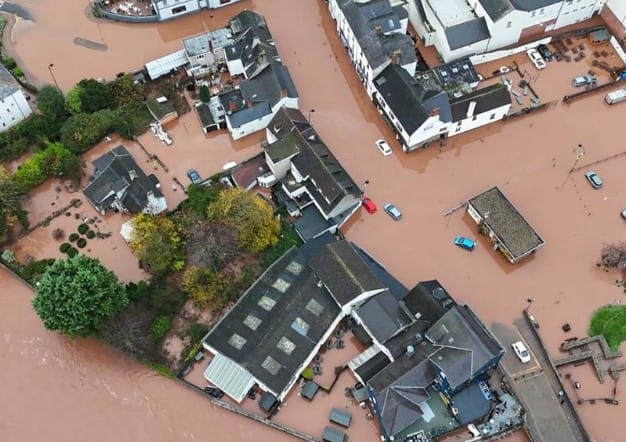Britain is bracing for an Arctic blast just as communities across Wales begin the painful recovery from one of the most destructive flooding events in recent memory.
Storm Claudia, which dumped over a month’s worth of rain on parts of England and Wales in a single weekend, has now passed — leaving behind devastated homes, submerged businesses, and a nation turning from flood warnings to freezing forecasts.
From Torrents to Ice: A Nation Whiplashed by Weather Extremes
As floodwaters recede in Monmouthshire, where the River Monnow reached record levels, a cold Arctic front is set to grip the UK.
Meteorologists warn that the country is shifting from being on the warm side of the jet stream — with mild winds from the Canary Islands — to the cold side, as polar air descends across Britain.
Temperatures are expected to drop to 5–10°C across most regions, with snow and sleet likely in northern and upland areas by Tuesday.
The Met Office forecasts brisk northerly winds and wintry showers throughout midweek, with snow flurries possible in Northern Ireland, north Wales, and the Scottish Highlands.
Monmouth: A Town Under Water, and Now Under Strain
In Monmouth, floodwaters swallowed entire streets, forcing residents to flee their homes and seek shelter in libraries and leisure centres.
Hundreds were left without power. As the brown flood tide ebbed, a thick sludge coated pavements and doorsteps — a grim reminder of how quickly nature can undo months of work.
County Councillor Martin Newell described the aftermath as “dreadful,” saying residents had “lost everything.” Businesses, he warned, may not recover before Christmas.
Local MP Catherine Fookes called it a “really worrying time,” urging an immediate review of flood defences while commending the “incredibly resilient and kind” community response, where volunteers supplied hot meals, clothing, and shelter.
For many, the shock lies not just in the damage — but in how familiar it feels.
The Monnow’s record crest surpassed those of Storm Dennis (2020) and Storm Bert (2024), making this the third major flood event in four years.
Such repetition raises urgent questions about Britain’s readiness for a new climate reality.
The Cost of Climate Complacency
Climatologists have long warned that warmer air holds more moisture, increasing the intensity of rainfall and the likelihood of flash floods.
Storm Claudia’s deluge — fuelled by a hyperactive Atlantic jet stream — was not an anomaly, but part of a growing trend of seasonal weather volatility across the UK.
Environmental campaigners argue that Britain’s infrastructure remains dangerously outdated, pointing to flood defences designed for 20th-century rainfall patterns.
Monmouth’s case mirrors countless towns where riverside barriers, drainage systems, and urban planning haven’t kept pace with extreme precipitation events.
Meanwhile, insurance data suggests that storm-related claims have more than doubled over the past decade, with local councils increasingly reliant on emergency government funds rather than long-term resilience planning.
Recovery, Relief, and the Road Ahead
As the major incident in Monmouthshire was lifted on Sunday, the clean-up began in earnest — mud-soaked furniture piled on kerbs, volunteers handing out blankets, and small business owners sweeping out water.
Rail lines across south Wales and western England, many damaged by landslides and submerged tracks, are gradually reopening, though National Rail continues to warn passengers to check before travelling.
The AA has urged drivers to avoid unnecessary travel amid freezing overnight conditions, cautioning that “the transition from flood to frost is when roads become most treacherous.”
For those rebuilding, the immediate task is survival. But for policymakers, the lesson is structural: the UK can no longer treat floods and freezes as separate events — they are two sides of the same climate coin.
Meteorological instability, once seasonal, has become the new baseline.
Beyond the Weather
The story of Storm Claudia is not just about rainfall totals or cold fronts; it’s about governance, foresight, and human cost.
Britain’s reactive approach to climate adaptation — waiting for the next flood before funding the next barrier — is proving unsustainable.
Experts have called for a national climate resilience strategy that fuses flood prevention, power grid fortification, and community disaster readiness into a single framework.
For Monmouth and similar towns, resilience now means more than sandbags — it means rethinking where and how we rebuild, ensuring the next storm does not rewrite the same story.
As Arctic air sweeps south and snow looms on the hills, Britain finds itself at a crossroads between relief and reckoning.
Storm Claudia’s destruction is a warning written in water and mud: the climate is no longer waiting for policymakers to act.
From Monmouth’s drowned high street to London’s icy pavements, the message is the same — adaptation is no longer optional.
